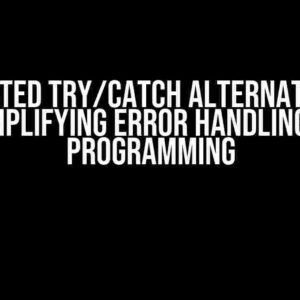Are you tired of Gunicorn swallowing up those pesky error HTTP status codes from your Flask app? You’re not alone! In this article, we’ll dive into the world of Gunicorn and Flask to explore whether it’s possible to allow error HTTP status codes to pass through from your Flask app. Buckle up, folks, it’s going to be a wild ride!
- Why Do Error HTTP Status Codes Matter?
- Gunicorn and Flask: A Brief Introduction
- The Problem: Gunicorn Swallows Error Status Codes
- Solution 1: Use the `propagate_errors` Argument in Gunicorn
- Solution 2: Use the `log_request` Argument in Gunicorn
- Solution 3: Use a Custom Error Handler in Flask
- Conclusion
- FAQs
Why Do Error HTTP Status Codes Matter?
Before we dive into the nitty-gritty, let’s take a step back and understand why error HTTP status codes are essential. HTTP status codes are a crucial part of the web development process. They provide vital information to clients (i.e., browsers) about the outcome of their requests. When an error occurs, it’s essential to return the correct error status code to inform the client of what went wrong.
The Importance of Error Status Codes
Error status codes serve several purposes:
- They provide feedback to clients about the outcome of their requests.
- They help with debugging and troubleshooting issues.
- They enable clients to handle errors programmatically.
- They improve the overall user experience by providing informative error messages.
Gunicorn and Flask: A Brief Introduction
For those who are new to the party, let’s quickly introduce our two main players: Gunicorn and Flask.
Gunicorn: The WSGI Server
Gunicorn is a popular WSGI (Web Server Gateway Interface) server that allows you to run your Python web applications. It’s known for its speed, reliability, and scalability. Gunicorn is often used in production environments to serve Python web applications.
Flask: The Microframework
Flask is a lightweight Python microframework that enables you to build web applications quickly and efficiently. It’s known for its flexibility, simplicity, and extensive libraries. Flask is often used for building small to medium-sized web applications.
The Problem: Gunicorn Swallows Error Status Codes
Now that we’ve introduced our players, let’s talk about the problem at hand. When you use Gunicorn to serve your Flask app, it can sometimes swallow up those error status codes. This means that instead of returning the correct error status code to the client, Gunicorn will return a generic error message.
This can be frustrating, especially when you need to return specific error codes to clients. So, how can we allow error HTTP status codes to pass through from our Flask app?
Solution 1: Use the `propagate_errors` Argument in Gunicorn
One way to allow error HTTP status codes to pass through is by using the `propagate_errors` argument when running Gunicorn. This argument tells Gunicorn to propagate errors from the application to the client.
gunicorn -w 4 -b 0.0.0.0:5000 --propagate-errors your_app:appBy adding the `–propagate-errors` flag, Gunicorn will pass through error status codes from your Flask app to the client.
Solution 2: Use the `log_request` Argument in Gunicorn
Another way to allow error HTTP status codes to pass through is by using the `log_request` argument in Gunicorn. This argument tells Gunicorn to log the request and response, including error status codes.
gunicorn -w 4 -b 0.0.0.0:5000 --log-request your_app:appBy adding the `–log-request` flag, Gunicorn will log the request and response, including error status codes, which can then be used to debug and troubleshoot issues.
Solution 3: Use a Custom Error Handler in Flask
Another approach is to use a custom error handler in Flask to return specific error status codes. This involves creating a custom error handler function that returns the desired error status code and message.
from flask import jsonify
@app.errorhandler(404)
def not_found(error):
return jsonify({'error': 'Not found'}), 404
@app.errorhandler(500)
def internal_server_error(error):
return jsonify({'error': 'Internal Server Error'}), 500
In this example, we’ve defined custom error handlers for 404 and 500 error status codes. These handlers return the desired error status code and message to the client.
Conclusion
In conclusion, Gunicorn can indeed allow error HTTP status codes to pass through from your Flask app. By using the `propagate_errors` or `log_request` arguments in Gunicorn, or by implementing a custom error handler in Flask, you can ensure that error status codes are returned to clients.
Remember, error status codes are essential for providing feedback to clients and improving the overall user experience. By allowing error status codes to pass through, you can create a more robust and reliable web application.
| Solution | Description |
|---|---|
| Use the `propagate_errors` Argument in Gunicorn | Tells Gunicorn to propagate errors from the application to the client. |
| Use the `log_request` Argument in Gunicorn | Tells Gunicorn to log the request and response, including error status codes. |
| Use a Custom Error Handler in Flask | Allows you to return specific error status codes and messages to clients. |
With these solutions, you can ensure that error HTTP status codes are returned to clients, providing a better user experience and improving the overall reliability of your web application.
FAQs
Q: What is the default behavior of Gunicorn when encountering an error?
A: By default, Gunicorn will return a generic error message to the client when encountering an error.
Q: Can I customize the error message returned by Gunicorn?
A: Yes, you can customize the error message returned by Gunicorn using a custom error handler in Flask.
Q: Will using `propagate_errors` or `log_request` affect the performance of my application?
A: Using `propagate_errors` or `log_request` may have a slight impact on performance, but it’s usually negligible. However, it’s essential to test and monitor your application’s performance to ensure it meets your requirements.
We hope this article has provided you with a comprehensive understanding of how to allow error HTTP status codes to pass through from your Flask app using Gunicorn. Happy coding!
Frequently Asked Question
Get the scoop on Gunicorn and Flask app’s error HTTP status codes!
Does Gunicorn block error HTTP status codes from my Flask app?
Nope! By default, Gunicorn does not intercept or alter the HTTP status codes returned by your Flask app. This means that error status codes will be passed through as-is to the client.
But I’ve noticed that error codes are being replaced with 500 Internal Server Error. What’s going on?
That’s a good catch! If you’re seeing error codes being replaced with 500, it’s likely because of the `error_handler` middleware in Flask. When an error occurs, Flask will catch the exception and replace the status code with 500 unless you’ve explicitly configured it to propagate the original error code.
How do I configure Flask to propagate error codes to the client?
Easy peasy! You can do this by setting the `propagate_exceptions` configuration variable to `True` in your Flask app. This will ensure that exceptions are re-raised and the original error code is preserved.
Does Gunicorn have any specific settings for handling error codes?
Yes, Gunicorn has a `error_handler` setting that allows you to specify a custom error handler. However, this is more related to handling internal Gunicorn errors rather than the error codes returned by your Flask app.
What’s the best practice for handling error codes in my Flask app?
The best practice is to handle errors explicitly in your Flask app using try-except blocks and returning custom error responses with relevant status codes. This way, you have full control over the error handling and can provide meaningful error messages to your users.









